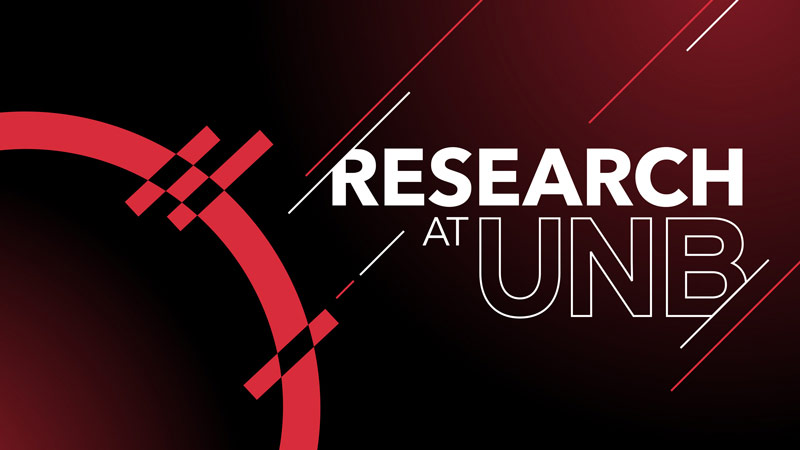UNB research week celebrates a diversity of work that makes our communities stronger
Author: Mark Leger
Posted on Oct 3, 2023
Category: UNB Fredericton , Research , UNB Saint John

In an article published in April in the leading journal, Nature, University of New Brunswick (UNB) associate professor Dr. Anthony Taylor was part of a team that reported on new research that shows that forests with a diverse mix of tree species are ideal for carbon sequestration, a crucial element in mitigating climate change.
Like a forest with a mix of trees that create a healthier environment, UNB has a diverse range of research activities that make our communities and economies stronger. As the university launches its second annual Research Celebration Week, it recognizes the teams at work in all departments, centres and institutes that make this impact possible.
There will be several events that are open to students, faculty, staff and community partners. On Wednesday in Fredericton and Thursday in Saint John, there will be presentations by UNB's new faculty members and early career researchers.
Throughout the week, there will also be tours and drop-ins at the New Brunswick Institute for Research, Data and Training, Wood Technology Centre and the Institute of Biomedical Engineering.
We will share videos and stories that highlight the work of just a few of the UNB researcher teams.
This year alone, we profiled many of the projects and initiatives in the UNB newsroom.
- Of course, we have Dr. Taylor’s research, who worked alongside colleagues at the University of Alberta, the University of Minnesota, the University of Tokyo and Lakehead University. “Part of Canada’s plan for meeting its Paris Agreement greenhouse gas reduction targets is to enhance forest carbon sequestration through ‘climate-smart forest management,’ said Dr. Taylor. “Our research supports this strategy and suggests maintaining functionally diverse forests should be part of the plan.”
- Dr. Sanjeev Seahra, a professor of mathematics and statistics at UNB, and Dr. Suprio Ray, a professor of computer science, worked with Fredericton company Black Arcs on an initiative that could help governments and experts with better pandemic response planning. Black Arcs and the UNB team collaborated on creating a new model to simulate COVID-19’s behaviour, building and refining a model that can both incorporate several real-world details and iterate through multiple scenarios quickly. “The modelling framework for this project was something novel, and we essentially developed it from scratch in collaboration with Black Arcs,” said Seahra. “The respiratory infectious disease model itself was modified from some of my older work.”
- The Catherine and Fredrik Eaton Charitable Foundation announced a gift of $1 million to make permanent the Fredrik S. Eaton Chair in Canadian Army Studies. The chair is housed within the Brigadier Milton F. Gregg, VC, Centre for the Study of War and Society on UNB’s Fredericton campus. “One of the goals of the Fredrik S. Eaton Chair has always been to provide information and skills to our military so that when they do face dangerous situations, they might have a better chance of returning safely from their missions,” said Frederik D. Eaton. “Our family thinks this gift is a fitting tribute to some of the things my father cared about so much.”
- Dr. Jon Sensinger, a professor of electrical and computer engineering and director of UNB’s Institute for Biomedical Engineering (IBME), is a leading, internationally recognized researcher in prosthetics and rehabilitation research. While much of IBME’s 60-year history has focused on prosthetics research, Dr. Sensinger and his colleagues have been pushing that expertise in new directions in rehabilitation over the past two decades. “I’ve been working on integrating artificial intelligence and prosthetic limbs since 2007,” said Dr. Sensinger. “I co-founded Coapt in 2012, a company that remains the global leader in this area today. Now, I’m working on expanding our ability to use AI to help people gain or regain mobility after strokes, spinal cord injuries or other complex rehabilitation scenarios.”
- In August, UNB launched the Research Institute in Data Science and Artificial Intelligence (RIDSAI) to help companies, community groups, and government understand, create and leverage a technology that PwC project could have a global economic impact of $15.7 trillion by 2030. “The potential applications – and benefits – of data science and AI are limited only by our imagination,” said Dr. Paul Cooke, the institute’s interim director and associate professor of computer science. “By working collaboratively, as researchers, industry and community, we can combine our creativity and our expertise to benefit New Brunswick, Atlantic Canada and beyond.”
Research Celebration Week events
Learn more about the range of ongoing research projects and partnerships
